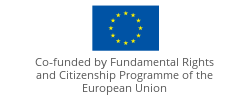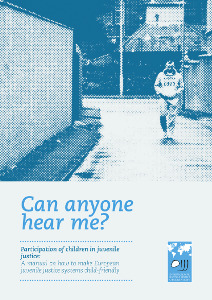
Microsite Improving JJS
“Can anyone hear me?”
Participation of children in juvenile justice: A manual on how to make European juvenile justice systems child-friendly
This Manual has the purpose of providing training to professionals working with children in conflict with the law and is specifically geared towards improving their communication with children. In this publication, topics relating to children’s legal rights, interviewing techniques, communication, child psychology and pedagogical skills are touched upon in the various chapters.
The Manual aims to provide information and to give further guidance on the implementation of the provisions of the new Directive of the European Parliament and of the Council on procedural safeguards for children who are suspects or accused persons in criminal proceedings. Information is provided with regard to the content of the Directive and how to implement the Directive in congruence with other relevant international and European standards in juvenile justice. This publication can also be used for the training of professionals in the field of restorative justice and mediation, in or around the juvenile justice system.
The Manual has been prepared by the Department of Child Law of Leiden University and is part of the project ‘Improving Juvenile Justice Systems in Europe: Training for Professionals’, led by the International Juvenile Justice Observatory.
Structure of the Manual
The Manual focuses on promising practices and techniques related to child-friendly justice. The aim of this publication is to disseminate knowledge on, and promote respect for, the rights of the child in conflict with the law. It covers the following topics:
- International and European standards in juvenile justice and adolescent development.
- General requirements: specific proceedings for children in conflict with the law, the role of legal or other assistance and the role of parents in juvenile justice.
- Effective participation: the right to information and the right to be heard.
- Communication skills: how to communicate effectively with children in conflict with the law.
- Follow-up and support: incorporating the views of children in conflict with the law in decisions and clarifying decisions.
In every chapter the implementation of the relevant international and European standards in practice is attended to. Basic requirements are given as to how to implement the standards in the different phases of the juvenile justice process. The phases that will be distinguished are: the phase of arrest and police interrogation; the phase of court proceedings and trial; the phase of disposition; and the phase of pre- and post-trial detention.
Good practices are presented in the Manual that relate to the topics discussed in that particular chapter. These practices serve as illustrations of how certain principles or legal provisions can be implemented in practice and were provided by the partner organisations. Therefore, these examples come from the countries of the partner organisations taking part in this project. These countries are: Austria, Cyprus, Czech Republic, Finland, France, Ireland, Italy, Latvia, Portugal and Spain. The partner organisations participating in this project are all members of the European Council for Juvenile Justice.

